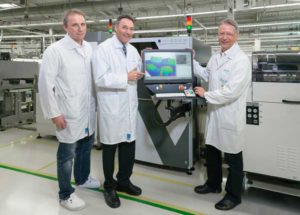 For solder paste inspection (SPI), automatic optical inspection (AOI) and automatic and manual X-ray inspection (AXI/MXI) technologies, DELTEC Automotive GmbH & Co. KG in Furth im Wald, Bavaria, Germany, relies on 3D systems from Viscom AG. Their user-friendly advantages are clearly evident.
For solder paste inspection (SPI), automatic optical inspection (AOI) and automatic and manual X-ray inspection (AXI/MXI) technologies, DELTEC Automotive GmbH & Co. KG in Furth im Wald, Bavaria, Germany, relies on 3D systems from Viscom AG. Their user-friendly advantages are clearly evident.
In the AOI area, DELTEC uses 3D inspection especially for detecting SOT (small-outline transistor) component bodies because this inspection technology has been proven to be the best for this task.
Thomas Fischer, manager of production and process technology at DELTEC, commented: “Of course there will always be important optical factors, such as the great number of different body designs with barely enough contrast to distinguish them from the printed circuit board background. The 3D AOI is simply better at this.”
The company uses the 3D AOI systems S3088 ultra and S3088 ultra gold from Viscom in its production lines.
The paste inspection with 3D also has proven its worth at DELTEC: “With this inspection technology, we are handed information about volume, paste height and other aspects and suddenly see, there are actually differences between one and another of the components which could not be determined in any other way,” states Fischer.
DELTEC deploys the automatic data exchange from Viscom (Closed Loop) between the Viscom S3088 SPI solder paste inspection systems and the Panasonic SP18 stencil printers in their lines. Depending on the solder paste offset values determined by the 3D SPI system, the print offset is automatically corrected over several printed circuit boards.
With this approach, instead of in one single step, an offset is corrected in several intermediate steps. This method achieves the optimum result.
Components from DELTEC are found, for example, in vehicles from the best-known European automotive manufacturers. In addition to ignition and control electronics, window control systems, sensors and USB charging adapters, headlights and taillights are foremost.
One essential criterion at DELTEC is the quality of solder joints on modern LED types. In many cases, they can only be inspected with X-ray. If defects such as air inclusions or solder beads are then identified, the result of the paste inspection system is extremely important.
This is where DELTEC employees use the possibilities provided by the user-friendly data connection from Viscom. Merging the information with the help of the Viscom Uplink Process Analyzer (VUPA) software tool makes fast optimization of production processes a reality.
DELTEC had a Viscom X7056RS equipped with its AOI and AXI functions so they could run a combined inspection in cases where the automatic optical inspection comes up against its limits, due to shadowing or other hindrances. The Viscom system is extensively used for process qualification at DELTEC.
Additionally, the company uses the Viscom X8011 PCB plus for manual X-ray inspection. One of the advantages of this system: “It is possible to take a printed circuit board to the machine and quickly see what is happening with a critical solder joint, without having to set up an elaborate program,” according to Fischer.
Statistical process control (SPC) from Viscom is used for evaluating real defects. Each production line is equipped with an SPC monitor.
For example, when a real defect is classified on the AOI system, the corresponding display promptly appears on the line and the operator receives just-in-time information indicating whether the specified limits are maintained or intervention is called for.
In this way, many hardware and software solutions from Viscom are intelligently linked at DELTEC and effectively improve the production process.
For additional information: www.viscom.com


